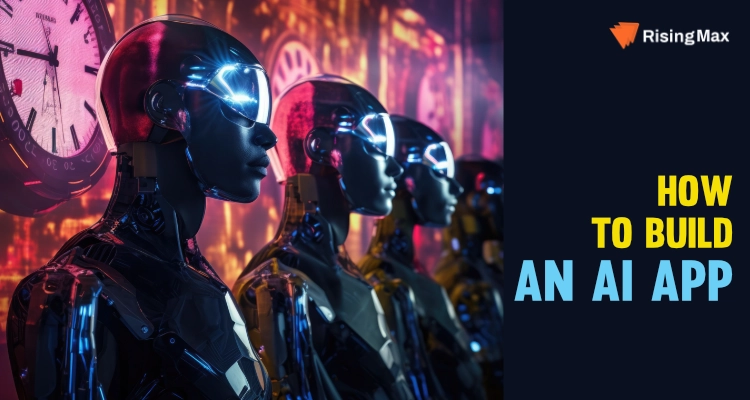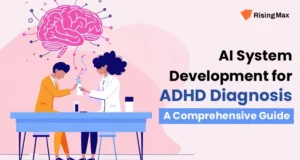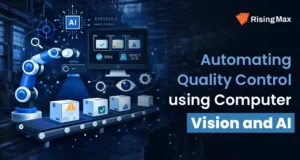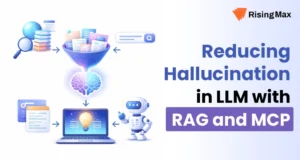AI (Artificial Intelligence) is widely used in our lives in different forms, from virtual assistants, such as Siri or Google Assistant, to image recognition and personalized recommendations in mobile apps. Now, as businesses learn the importance of AI, they want to develop their own applications. And here, the question arises: How to make an AI app?
According to Statista’s forecast, the artificial intelligence industry will reach a value of US$305.90 billion by 2024. To reach the volume of $738.80 billion in 2030, with a growth rate of 15.83% per annum. (CAGR 2024–2030).
We will go through the steps of building an AI app, the areas using AI, and the pros of AI for businesses. In addition, we will present a step-by-step guide on AI application development, talk about the tech stack for AI application development, and provide information regarding the cost of building an AI app.
| Table of Contents |
|
What Is Artificial Intelligence?
AI or artificial intelligence is a term in the field of computer science to describe activities such as programming machines to do tasks that require human-like capabilities. It is worth noting that AI does not mean a machine that imitates the consciousness or emotions of a human being. Rather than this, the focus is on developing intelligent systems to perform specific tasks.
Here are some key aspects of AI:
It’s a broad field: AI consists of several subfields that focus on different areas of intelligence, such as machine learning, computer vision, robotics, and natural language processing.
It involves different approaches: There is no standard approach to building AI systems. Depending on the task and the desired result, different techniques are applied, including rule-based systems, machine learning algorithms, and deep learning models.
It’s impacting our lives: AI is present in many places where we can find it, for instance, facial recognition on our phones or personalized suggestions on our streaming services. The application fields of technology are expanding and becoming deeper in various areas.
Contact Our Experts To Know How To Create AI Applications.
AI technology is evolving at a fast pace and has huge effects on many aspects of human lives. If you want us to give you a deeper insight into certain AI issues or if you have inquiries about how to make an AI app, please don’t hesitate to ask!
How do AI Applications in Mobile Technology Work?
AI has greatly empowered mobility apps to move to an innovative era, rendering the user experience better and offering additional functions as well. These are just a few examples of how AI is used in mobile apps. Businesses have various options to explore, and they can leverage AI platforms to create excitingly unique and customer-centric experiences. Let’s discuss some prominent areas of AI application in the mobile apps below:
Image & Object Recognition
In mobile apps, image and object recognition are rapidly gaining popularity. Apps, including Wanna Kicks, employ AI algorithms for immersing and combining virtual objects with real-life images. The scope of this particular technology is pretty broad (healthcare, e-commerce, etc.)
Text Recognition
With smart OCR for mobile technology, apps for humans can handle tasks such as translating, cutting, and pasting texts. This type of AI technology is used in some language learning apps, document scanning apps, etc.
Speech-to-text
Voice assistants like Siri, Google Assistant, and Alexa recognize and explain user commands through speech-to-text and NLP technologies, respectively. There is no limitation to using AI-originated apps on mobile devices to take up or expand the scope of other non-voice features, such as virtual nurse talks and language processing.
Optimal Routes
Mobile apps usually function this way in order to save the user’s time by directing him to the shortest and most efficient route, which in turn helps in transportation and trip planning. AI-based route optimization, therefore, ensures that the end users gain from this kind of app.
Personalized Recommendations
AI enables the application of mobile devices to offer personalized recommendations depending on user interests and actions. It is not a novel feature as it can be found in many music streaming services, e-commerce websites, and content recommendation systems.
Industries That Are Benefitting From AI Apps
AI is capable of transforming a lot of industries, providing new efficiencies, productivity, and customer satisfaction. These sectors are simply a few examples through which AI can bring value to firms. The advancement of AI will undoubtedly open a vast space for innovation and transformation in numerous fields.
Fintech
Artificial Intelligence (AI) could be used by FinTech when it develops budget prediction models or credit underwriting models, robo-trading, and personalized customer support. AI-powered algorithms can conduct data dependence analysis of large quantities of financial data. Therefore, the decision-making process turns out to be faster and more accurate.
Healthcare & Fitness
AI is reshaping the healthcare industry to screening and therapy, medical imaging analysis, real-time pose estimation, and drug discovery. On top of that, fitness apps can employ AI to come up with personal exercise programs and follow user progress.
Entertainment
Entertaining apps are able to utilize AI to improve user experience. The entertainment industry is an area where AI can be used in a variety of ways – from AI players in games, AI-based recommendations, or a combination of AI and other technologies (AR and VR) – which are only a few of many examples. Additionally, several AI applications, such as generative video creation, AI face swap apps, and interactive chat prompts, are gaining significant popularity. These applications are considered entertainment tools and assist users in creating enjoyable content.
Transportation & Delivery
The transportation and delivery sector will take advantage of AI for the best route planning, ETA calculations, and license plate recognition. The use of AI algorithms can streamline logistics operations, improve efficiency, and increase customer experiences.
Education
AI can affect the education process in a highly significant way; it can provide AI-assisted grading, personalized learning paths, smart content production, and student performance analytics. This technology can help students learn more efficiently, achieve better results, and get tailored education.
Energy & Manufacturing
The energy and manufacturing sectors can implement AI for quality control, inventory management, product design, and machinery diagnoses. AI-based algorithms can analyze data from sensors and machines in order to predict maintenance and improve production.
Benefits Of AI Mobile Apps For Business
The applications of AI on mobile platforms provide a lot of benefits to businesses that wish to increase efficiency, productivity, and customer satisfaction. These perks clearly indicate how these AI mobile apps can shape businesses and trigger growth in the digital era.
Rapid Analysis Of Immense Data
AI algorithms can swiftly comb through huge datasets and deliver useful information, which in turn improves decision-making speed. This feature allows companies to identify patterns, trends, and correlations that can be hard to spot otherwise.
Enhanced Decision Making
Applications that are AI-powered can help businesses get data-driven insights that, in return, enable more informed decision-making. Through data analysis and pattern identification, AI algorithms give recommendations and predictions that enable businesses to decrease operational and strategy costs.
Increased Customer Engagement
AI-infused personalization features allow businesses to serve customized experiences to their customers. Through the analysis of user preferences and behaviors, AI-powered applications can offer personalized recommendations, customized content, and targeted marketing campaigns, which will, in turn, lead to greater customer engagement and satisfaction.
Reduced Manual Labor
AI automation can largely eliminate the need for manual labor during many business processes. Through the use of automation, businesses can reduce the burden of repetitive and time-consuming tasks, enabling employees to channel their time and resources to more strategic and creative tasks, thus increasing productivity as well as efficiency.
Lower Operating Costs
AI apps can assist businesses in cutting down their operating costs by automating processes, preventing errors, and making the most of their resources. Businesses are able to realize cost savings in areas like labor, energy, and materials through the implementation of streamlined operations and improved efficiency.
How To Build An AI App: Development Guide
Developing an AI application involves thoughtful and well-orchestrated processes. This guide will enable you to get through all the stages of AI application development and ensure the creation of the AI app is successful. The following are the steps that you should follow in order to understand how to create an AI app.
Discovery
First of all, you should set your goals and then identify the problem you want to solve using your AI app. Perform the market research, identify your target market, and write down the main features and functions you want to incorporate. The first stage sets the tone for the rest of the development cycle.
Proof Of Concept
Before the large-scale implementation begins, run a proof of concept to validate the AI models you have developed. This means testing and refining the algorithms so that they can give the expected results. The proof of concept might be limited in UI/UX and prioritize models validating AI performance.
Prototype
Upon completion of the concept proof, go on and produce a prototype of your AI app. The mock-up should contain the main screens and features of the app to collect user feedback and optimize the UI/UX design. This iterative process makes the final product of expected quality.
Design
After having the prototype ready, focus on your AI app’s overall design. Add the remaining screens and create a good UI/UX experience. Pay attention to details such as AI animations, button states, and general design aspects. A design system would be a good tool to unify the design process.
Development
The AI app will be brought to life by developers in the build phase with the coding of the front end and its integration of the AI algorithms. Agile consulting approaches may be used to boost transparency, communication, and adaptability in decision-making. Make a decision whether to use a pre-existing AI model or to train your model according to your specific needs.
Testing, Deployment, and Maintenance
Properly test the AI app to unveil and eliminate bugs, if any exist. Release the app once it is stable on the platform it runs on, such as the App Store, Google Play, or any other distribution channels. Constantly monitor and maintain the app to handle user feedback, update the idea of AI models, and introduce new features.
Launch your AI application and Streamline your business processes with RisingMax
How Much Does It Cost To Make An AI App?
AI development cost varies greatly due to many factors, including the level of complexity, functionality, development team rates, and project timeline. AI application development is usually a multi-stage process comprising some of the steps like discovery, prototyping, design, development, testing, and deployment.
Consider these elements for a rough cost estimation.
Project Scope & Complexity: The complexity of the AI app that you will develop, which comprises the number of features, AI algorithms, and integration requirements, will play a determinant factor for the overall cost.
Development Team: The members of the development team, such as the designers, developers, and AI specialists, will be the factors determining the cost. Rates may differ in different areas and depend on the level of the crew’s qualifications and experience.
Tech Stack: A choice of technologies and tools can impact the software development time and cost. Some technologies may request new licenses or subscriptions.
Testing & Deployment: It is recommended to use the beta-testing and release management processes in case of a successful AI application. Think about the costs associated with quality assurance and deployment.
Maintenance & Updates: Continuous maintenance and upgrades are necessary to ensure that your AI application is working properly and securely. Be prepared to consider post-launch costs and future modification requirements.
Considering these elements, the accurate amount of cost can not be calculated without rigorous project study. We recommend connecting with competent AI app development agencies or professionals in order to receive cost forecasts that will be based on your individual needs.
Closure
Developing an AI platform can be a daunting yet exciting journey. Contact RisingMax’s AI experts to get familiar with the AI app development process so that you can deliver valuable experiences successfully to your customers. Remember to take into account how to build an AI app, how AI can be used in your industry, what advantages it might bring to your business, and what the cost factors will be. If you set the frameworks to employ the skills and technology stack, you will leverage AI to evolve your business and win the digital age.














